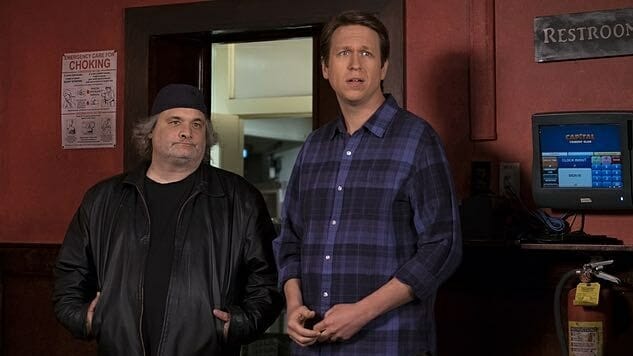Essential Sitcom: Crashing Is the Deeply Personal Story of a Comedy Anti-Antihero
Comedy Features Crashing
For a different take on Crashing, read Seth Simons’s critical examination.
Note: This piece appears in the Essentials section of Paste Quarterly #1, which you can purchase here, along with its accompanying vinyl Paste sampler.
The pockmarked TV landscape isn’t hurting for another sitcom loosely based on the real life experiences of a stand-up comic. That’s the supposedly winning formula that helped create such standard-bearing half-hours as Seinfeld and Louie, and such ignominious flops as Mulaney and the Andrew “Dice” Clay vehicle Bless This House.
The world seems to be approaching HBO’s Crashing, the Judd Apatow-produced vehicle for good-natured goofball Pete Holmes, with a healthy amount of suspicion, wondering which path this new series is going to follow. While it’s too early in its existence to add it to the pantheon of greats, this show’s warm heart and gracious humanity could bring its star a flock of new fans.
Holmes does play a comic on Crashing, but without the cool confidence that his predecessors like Seinfeld and C.K. exhibit. He’s barely in the pupal stage of his stand-up development. When we see him onstage for the first time, he’s drawing polite chuckles out of an open-mic audience. At his next gig, he flames out hard. And throughout the series, the onscreen Holmes only gets marginally better as a comic.
That’s part of what makes this show so rare: rather than dropping viewers in medias res in his career arc, we catch Holmes right at the start, dealing with the various indignities that many a burgeoning comic goes through. The tartest and most endearing episode finds Holmes and some fellow stand-ups gaming for slivers of stage time by “barking,” or handing out fliers for a comedy club to passersby. Like Mike Birbiglia’s equally sincere film Sleepwalk With Me, we get a glimpse into the often-stumbling process that any comic goes through before they get anywhere close to funny, and the succession of minor victories they score on their way there.
As the deeply personal project it is, Crashing also has some demons to exorcise. Almost a decade ago, Holmes’ six-year marriage ended after he discovered his wife was having an affair. Ever since, he’s been very public with working through his emotions about the experience on both his podcast (You Made It Weird) and his first foray into television (a short-lived eponymous talk show), and admitting his complicity in his ex-wife’s misdeed.
For both Holmes and his onscreen proxy, it was that experience that helped push him into New York and onto the couches of various kindly fellow comics (played here by the likes of Artie Lange, Sarah Silverman and TJ Miller) in Crashing. That sets him up for all manner of adventures, like trying to keep his new friend Lange from relapsing on his sobriety during a road gig and a reassessment of how he’s been living his life up to that point.
It’s the kind of story that is almost reflexive for Apatow: the man-child attempting to walk on his own for the first time. The unusual addition here is how much religion plays a role in this. It’s not just that he had to walk in on his wife (sensitively embodied here by Lauren Lapkus) and her co-worker in flagrante; he now has to reckon with the loss of this church-bred belief that she would be faithful and supportive through all eternity.
Holmes’s other Apatovian quality is that he’s a lovable galoot that feels worth rooting for—the kind of earnest, gracious lunkhead who would earnestly ask a drug dealer for advice on protecting his barking turf and, with fear in his eyes, reject the sexual advances of Gina Gershon. He’s the anti-antihero the world greatly needs.
Robert Ham is an arts and culture journalist based in Portland, OR. Read more of his work here and follow him on Twitter.